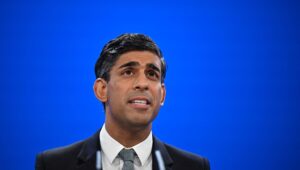Rishi Sunak doesn’t know what he’s trying to sell. Suella Braverman does. Herein lies a problem for the Conservative Party.
Just over a year ago, Sunak claimed his mandate to govern came from Boris Johnson’s victory in 2019, a victory that was, he insisted, “not the sole property of any one individual” but that of the entire party. “And the heart of that mandate is our manifesto,” Sunak declared triumphantly outside No 10. “I will deliver on its promise.”
Within a year, Sunak had junked it completely: corporation tax was hiked to 25% and HS2 scrapped. Sunak then spun these moves as part of a new mission to end the “30-year political status quo” which he wasn’t a part of. Then, a month later, he sacked Suella Braverman and made David Cameron Foreign Secretary.
In terms of short-term political tactics, there is a certain logic at work. The story — for a day or two at least — is no longer about the former Home Secretary or the “hate marches” that have so divided the Conservative Party since the mass slaughter of Israelis on October 7. But what are voters supposed to make of it all? Is Sunak still out to end 30 years of political failure? Or just the past seven years of failure since Cameron was last in office?
The reshuffle reveals the terminal nature of the crisis now facing this Government. These are its dying spasms. A year ago, Sunak tried to resuscitate the Johnson coalition by appointing Braverman Home Secretary. The gambit inevitably failed. Johnson’s coalition was gone by the time Sunak took charge, killed by Partygate and Truss’s mini-budget. Sunak then tried the hopey-changey thing, but voters hated it, with polls at the weekend predicting a landslide defeat for the Tories worse than in 1997. Now Sunak seems to be trying to rebuild the Cameron coalition that was upended by Brexit. But Cameron’s coalition is also long gone.
And the war for the future of the Conservative Party has begun.
For the Conservative Left, Cameron’s appointment to Foreign and Braverman’s sacking from Home is long overdue. “The fanatical fringe we call the Tory hardline Right will be the death of modern Conservatism unless Tories wake up to the reality that these people are not the party’s friends,” Matthew Parris wrote in The Times on Saturday, urging Sunak to sack Braverman. The most obvious option for Sunak would have been Kemi Badenoch, who also shares similarly “sound” views about cultural issues, but does not carry with her the same sort of melodrama. Had Badenoch been promoted to the Home Office, there would at least have been a semblance of intellectual coherence about this reshuffle. As one senior Tory who is fond of Cameron put it to me yesterday: “This isn’t a strategy, it’s about shafting your enemies.”
The political story here, then, is simple: Sunak defenestrating the Right of the party. It is, in a sense, Sunak’s coming-out party: the moment he reveals his real politics. He will now fight the next election as a moderate, liberal conservative. The problem for Sunak is that while Braverman might easily be discarded, Suella-ism will prove much harder to get rid of. Ultimately, she is expressing a feeling about modern Britain that is shared within the Conservative Party — beyond the fringes of its hard Right.
In many respects, Braverman’s downfall is her own fault: she botched her attack on the police in The Times, failed to clear it properly with No. 10, went too early and failed to use the power of her office to achieve concrete results. Braverman is far from the first Tory Home Secretary to take on the police; she is just the least successful. Theresa May, remember, took them on in 2015 and won.
At the heart of Braverman’s attack on the police is a much more interesting ideological shift taking place in the Tory party, and one, whatever its faults, that has a far more coherent story to tell about British politics over the last 13 years than Sunak has yet to come up with. Her story is this: the Conservative Party has failed. It won elections, but failed to change the country. Yes, it took Britain out of Europe, but — and here is the essence of Suella-ism — the Blob remains in charge: the courts remain all-powerful, schools promote their own ideology, police declare that “jihad doesn’t mean jihad”. It is time, she insists, to take back control.
One fundamental mistake people make with politics is to constantly seek to dismiss people they don’t like as a throwback to some distant era. As such, Braverman is a modern-day Enoch Powell, or little more than the latest incarnation of the Tory party’s unchanging, loopy hard Right. But far more interesting is to see politicians for what they are: expressions of the Britain that exists now, with all its anxieties, paranoias, prejudices and complexities. Keir Starmer is not Harold Wilson — he is the leader of an altogether new Labour party, representing a new coalition of voters, which is why he is finding the crisis in Gaza so challenging. Likewise, the concern for those who so obviously loathe Braverman should be that she is touching a nerve about today’s Britain.
I have felt a sense of gnawing unease that something fundamental has changed in the country since October 7, and perhaps even in the West; as if we’re living through some kind of great national argument where things are being said that cannot ever be unsaid, images seen that cannot be unseen. The Braverman battle with the Met is part of this national row, but only one part of it.
In the four weeks since Hamas’s orgy of slaughter, we’ve had four mass demonstrations in London, all in support of Palestine, which, taken together, amount to the biggest display of antisemitism in Britain since the Thirties, even though the vast majority of protesters were not hate-filled. In response, unlike France, we’ve had no mass display against antisemitism or sense of outrage at the hostages currently being held in Gaza, only a mob of nationalist hooligans rampaging around London looking for a fight. I can well understand why, for many Jews, this has been a far more profoundly unsettling moment than I can ever comprehend.
The images that I have found most unnerving over the past weeks are the little acts of social breakdown that now seem to be bleeding through everyone’s Instagram reels and Facebook accounts: the thugs in balaclavas surrounding the one lone man brave enough to stand with a placard likening Hamas to Isis; the fights breaking out in train stations; the racists on buses asking if passengers are Jewish; the placards calling Suella Braverman and Rishi Sunak “coconuts”. Even the degree of violent, elemental loathing for Braverman which seems to be considered fair game hints towards something darker underneath. “She’s fucking gross,” spat the comedy-commentator Jonathan Pie in one of his recent videos. “Full of hate and bile and lies; just lies and filth; utter filth that comes out of that monster’s mouth.”
We’ve lived through moments of murderous trauma before, of course: 9/11, 7/7, Charlie Hebdo, Lee Rigby, the Bataclan. But have any been quite as psychologically successful as this one in revealing quite so much division, quite so quickly? Each of the previous terrorist attacks brought about a moment of cohesion. The opposite has happened here. Part of this seems to be the nature of the violence that was on display. September 11 was purposefully cinematic in its scale; October 7 in contrast was made for the mobile phone: genocidal snuff pornography, its depravity the point. A pogrom designed to divide — and so it has.
It would take a brave soul to believe that the removal of Suella Braverman and the appointment of David Cameron as Foreign Secretary can somehow whisk us back to a time before the division, when common sense and level heads reigned. This wasn’t true then and isn’t now. If she wants to win the Tory leadership, Braverman is going to have to explain why she achieved so little in office. But whatever happens to Braverman herself, the Tory liberals are going to need a better story to explain their own failure if they are to defeat Suella-ism in the long term.
Disclaimer
Some of the posts we share are controversial and we do not necessarily agree with them in the whole extend. Sometimes we agree with the content or part of it but we do not agree with the narration or language. Nevertheless we find them somehow interesting, valuable and/or informative or we share them, because we strongly believe in freedom of speech, free press and journalism. We strongly encourage you to have a critical approach to all the content, do your own research and analysis to build your own opinion.
We would be glad to have your feedback.
Source: UnHerd Read the original article here: https://unherd.com/




